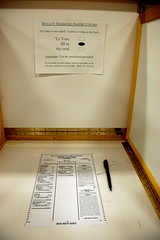 Inside Higher Education reports on new work from Neil Gross, a sociologist at the University of British Columbia, whose research explores today’s faculty politics. This new study engages the contentious and ongoing debate over professors politics. Inside Higher Ed notes, “Right-wing critics make much of the fact that many surveys have found professors — especially in the humanities — to be well to the left of the American public. This political incongruence is frequently used as a jumping off point to suggest that professors are indoctrinating students with leftist ideas.”
Inside Higher Education reports on new work from Neil Gross, a sociologist at the University of British Columbia, whose research explores today’s faculty politics. This new study engages the contentious and ongoing debate over professors politics. Inside Higher Ed notes, “Right-wing critics make much of the fact that many surveys have found professors — especially in the humanities — to be well to the left of the American public. This political incongruence is frequently used as a jumping off point to suggest that professors are indoctrinating students with leftist ideas.”
The analysis, Neil Gross explains, indicates that “conservative critics are correct about humanities professors’ leanings, but incorrect about their views of what classroom responsibility entails.”
In fact, Gross finds — in a study based on detailed interviews of professors’ in various disciplines — that faculty members take seriously the idea that they should not try to force their views upon students, or to in any way reward or punish students based on their opinions. And this view is shared by professors who see their politics playing a legitimate role in their research agendas, not just those who view their research agendas as neutral.
The aim of this new research is, in part, Gross writes, to shift the discussion of professorial politics away from the unsurprising (many professors are liberal) to “a more systematic” study of how “academicians in various fields and at various points in time understand the relationship between their political views, values, and engagements and their activities of knowledge creation and dissemination, and to how such understandings inform and shape academic work and political practice.” It’s not enough to simply document professors’ politics, Gross writes. What is needed is more attention to how professors handle the “knowledge-politics problem” in their work.
Specifically, the findings in the interviews Gross conducted raise questions about the assumptions of some critics of academe that one can draw conclusions about what goes on in classrooms based on the political and research writings of professors.





